GoDaddy vs Carrd: Final verdict
GoDaddy and Carrd both offer unique advantages, but they cater to different user needs.
-
GoDaddy (Overall Grade: 7.5/10)
is a comprehensive platform ideal for users seeking a full-featured website builder with robust ecommerce capabilities, extensive templates, and strong customer support. It excels in providing a wide range of services, including domain registration, web hosting, and online marketing assistance. When comparing GoDaddy vs Carrd, GoDaddy is the better choice for businesses looking for a versatile and scalable solution. -
Carrd (Overall Grade: 6.1/10)
is perfect for individuals and small businesses needing a simple, affordable, and user-friendly platform for creating single-page websites. Its ease of use, attractive templates, and efficient design make it an excellent option for personal profiles, landing pages, and portfolios. In the GoDaddy vs Carrd comparison, Carrd stands out for its simplicity and cost-effectiveness, making it ideal for quick and straightforward website creation.

|

|
|
|---|---|---|
|
Design functionalities & templates |
8.0 |
7.5 |
|
Ease of use |
8.2 |
9.0 |
|
Ecommerce |
7.2 |
3.5 |
|
Website Editors |
6.7 |
7.0 |
|
Product testing options |
8.1 |
6.0 |
|
Price |
7.9 |
8.9 |
|
Hosting quality |
7.8 |
5.0 |
|
Website speed optimization |
7.6 |
8.2 |
|
Plugins and integrations |
7.3 |
5.8 |
|
Marketing features |
7.3 |
5.8 |
|
Customer support |
8.5 |
6.2 |
|
Security |
6.8 |
7.6 |
|
AI capabilities |
7.5 |
0.0 |
|
User Management |
7.3 |
4.3 |
| Overall |
7.5 |
6.1 |
Which one is the best for ecommerce: GoDaddy or Carrd?
 7.2
7.2
 3.5
3.5
Verdict
: GoDaddy is better suited for businesses looking to establish a comprehensive online store, while Carrd is ideal for simple, single-page ecommerce solutions.
-
GoDaddy
: With a score of 7.2, GoDaddy offers a robust set of ecommerce features, including payment processing, shipping options, SEO tools, and detailed reports. It is a versatile platform that supports a wide range of ecommerce needs, making it a strong choice for businesses aiming to grow their online presence. However, when comparing GoDaddy vs Carrd, GoDaddy’s extensive features might be more than what is needed for very simple websites. -
Carrd
: Scoring 3.5, Carrd is designed for simplicity and ease of use, making it perfect for single-page websites. It offers basic ecommerce functionalities like PayPal and Stripe integration, but lacks the comprehensive features found in GoDaddy. This makes Carrd a good option for individuals or small businesses looking for a quick and straightforward way to sell products online.
Which one is the best for informational and business websites?
 7.9
7.9
 7.9
7.9
Verdict
: Both GoDaddy and Carrd score equally at 7.9 for informational business websites, but they cater to different needs. GoDaddy is more comprehensive with a range of services, while Carrd excels in simplicity and ease of use.
-
GoDaddy
: GoDaddy offers a robust platform with extensive templates and customization options, making it suitable for a wide range of business types. Its comprehensive services, including domain registration, web hosting, and online marketing assistance, make it a versatile choice for businesses looking to establish a strong online presence. However, its user-friendly interface still requires a bit of a learning curve compared to Carrd. -
Carrd
: Carrd is ideal for those who need a simple, single-page website quickly. Its straightforward interface and variety of templates make it perfect for personal profiles, landing pages, and small business portfolios. Carrd’s ease of use and efficient design make it a strong contender for individuals and small businesses looking to create an attractive and functional website without extensive web development skills. When comparing GoDaddy vs Carrd, Carrd’s simplicity and affordability stand out.
GoDaddy vs Carrd: Detailed comparison
Design functionalities & templates
Design FunctionalitiesRepresents how well each platform allows for creative design and customization of websites.Score Components:
- Template Variety (30%): Range and quality of design templates.
- Customization (30%): Flexibility and options for design alterations.
- User Interface (20%): Ease and intuitiveness of the design process.
- Responsiveness (10%): Adaptability to different devices and screen sizes.
- Innovation (10%): Unique design features and tools.
 8.0
8.0
 7.5
7.5
🏆
Winner: GoDaddy.
If you’re looking for a platform that offers more creative control and a wide array of design features, GoDaddy is the preferred choice.
GoDaddy provides an extensive collection of over 1500 website templates catering to diverse industries and design preferences. These templates cover business, ecommerce, creative, personal, and non-profit sectors, offering various styles such as modern, classic, bold, minimalist, and content-focused. With customization options, mobile responsiveness, and a combination of free and premium templates, GoDaddy aims to meet the needs of users seeking versatile and visually appealing website designs.
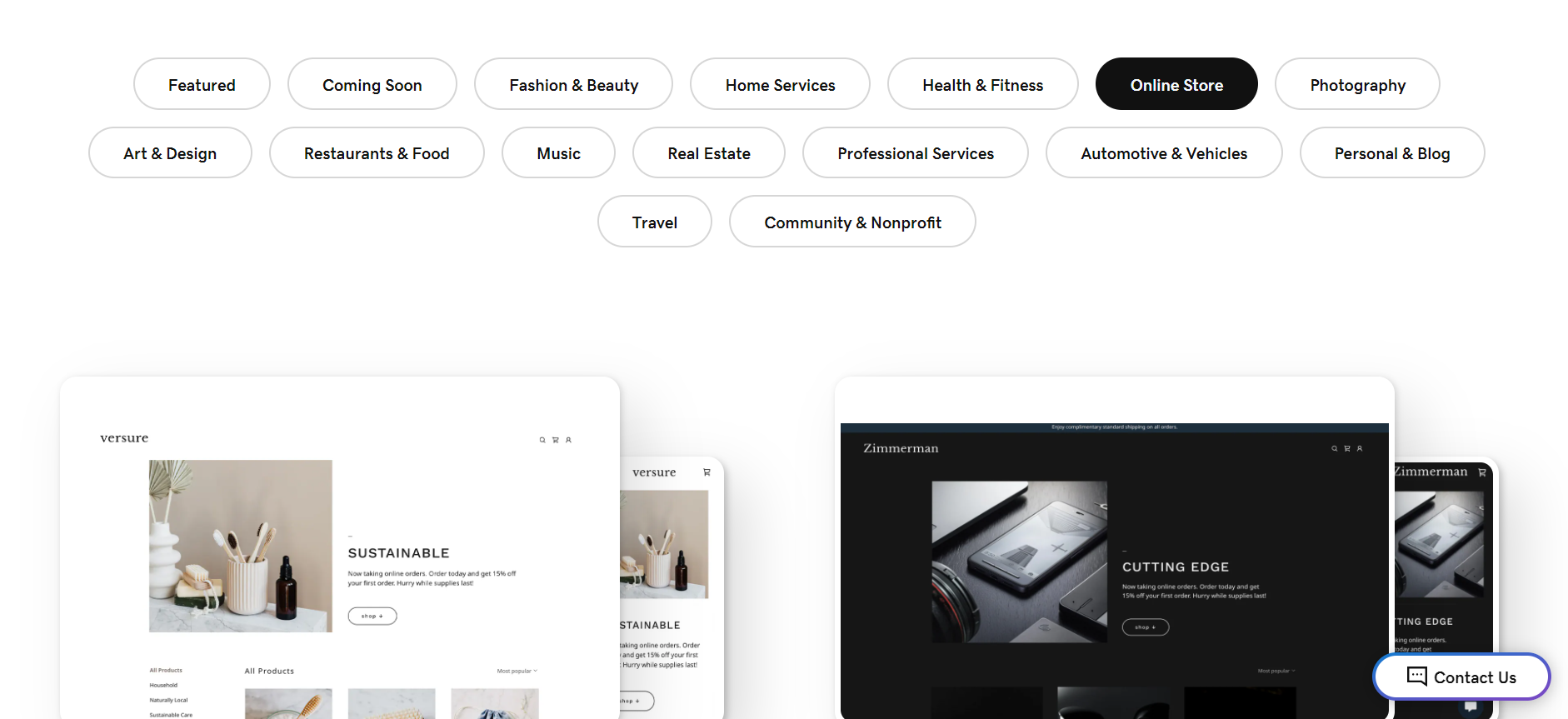

Compared to GoDaddy, Carrd is a versatile platform that offers a wide variety of templates and designs, catering to different needs and preferences. Users can choose from a broad selection of themes, ranging from simple and minimalist to complex and dynamic layouts, ensuring there’s something for everyone. The platform continuously updates its library with new designs, keeping up with the latest trends in web design. With its user-friendly interface, Carrd makes it easy for users to customize templates, allowing for a high degree of personalization and creativity in creating unique websites.


Get a head start on website creation with AI
Create a custom website tailored to your business needs 10X faster with 10Web AI Website Builder!
Ease of use
Ease of useReflects the platform’s overall user-friendliness.Score
Components:
- Learning curve (40%): Quickness and ease of getting started.
- Interface design (30%): Simplicity and intuitiveness of layout.
- User guidance (20%): Quality of tutorials and support.
- Flexibility (10%): Adaptability to various user skills.
 8.2
8.2
 9.0
9.0
🏆 Winner: Carrd
. With a score of 9.0, Carrd is designed for simplicity and ease of use, making it ideal for beginners and those seeking to create single-page websites quickly. GoDaddy, scoring 8.2, also offers a user-friendly platform, but Carrd’s straightforward approach to website building gives it the edge in this category.
Learning Resources
🏆 Winner: GoDaddy
. Both platforms offer solid learning resources, but GoDaddy provides a more comprehensive set of resources for its website builder, including online documentation, video tutorials, community forums, and live sessions.
For ecommerce
EcommerceMeasures the platform’s effectiveness in supporting online business activities.Score Components:
- Ecommerce themes and templates (20%): Variety and design of templates.
- Product management (25%): Ease of managing and organizing products.
- Payment options (25%): Variety and convenience of payment methods.
- Ecommerce features (20%): Features for managing an ecommerce store.
- Integration (10%): Compatibility with external e-commerce tools and services.
 7.2
7.2
 3.5
3.5
GoDaddy and Carrd offer different experiences when it comes to ecommerce. GoDaddy provides a more comprehensive set of ecommerce features, making it a better choice for businesses looking to set up and manage online stores. Carrd, on the other hand, is more suited for simple, single-page websites and does not offer robust ecommerce features out of the box.

|

|
|
|---|---|---|
|
Ecommerce themes and templates |
6.5 |
4.5 |
|
Product page customization |
6.0 |
3.0 |
|
Payment processing and commissions |
7.5 |
5.0 |
|
POS capabilities |
6.0 |
0.0 |
|
Payment gateways |
7.0 |
5.5 |
|
Product numbers |
7.0 |
2.0 |
|
Additional ecommerce features |
6.5 |
3.5 |
GoDaddy ecommerce features:
- Payment processing
- Shipping options
- SEO tools
- Email marketing features
- Social media integrations
- Detailed reports
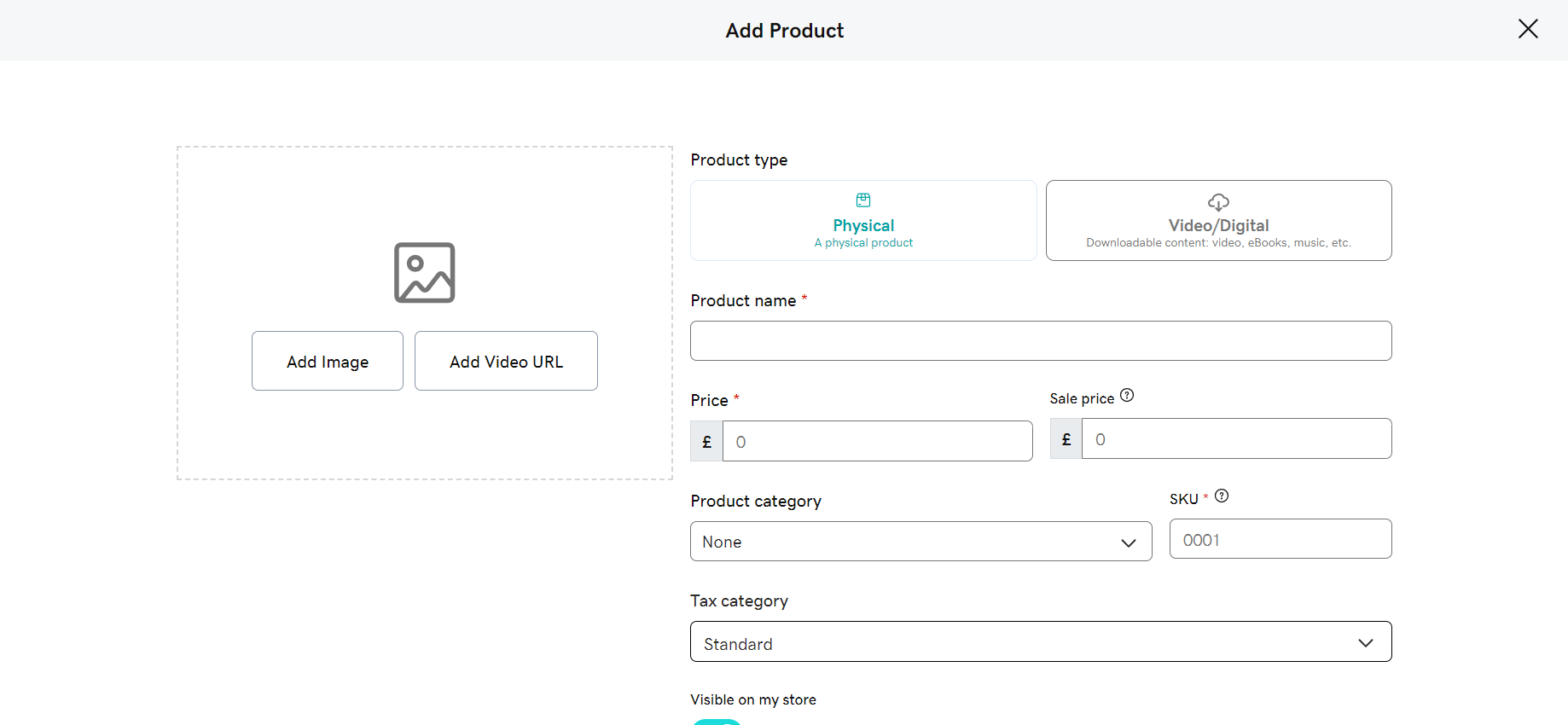
Carrd ecommerce features:
- Paypal and Stripe Integration
- External Widgets integrations
- Basic Product Listing options
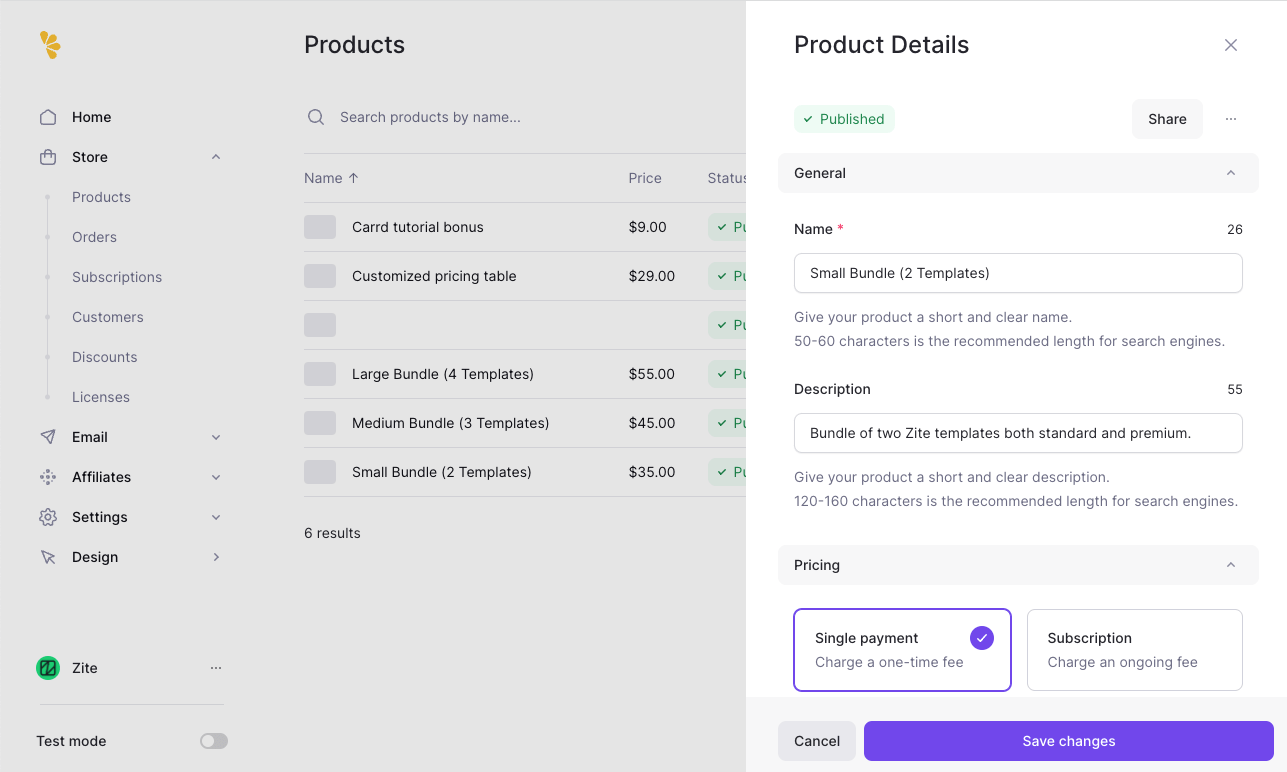
Ecommerce themes & templates
GoDaddy offers around 70-80 ecommerce themes that cover diverse industries and styles. These themes are generally mobile-friendly with basic customization options. However, they may lack the niche variety and cutting-edge designs found on dedicated ecommerce platforms. Carrd provides a selection of 14 ecommerce templates aimed at users looking to quickly launch online stores. These templates are crafted with a focus on simplicity and conversion optimization.
Product page customization
GoDaddy offers basic customization options like editing content, adding images, and adjusting layouts. For advanced customization, coding knowledge is required. Carrd offers a streamlined approach to ecommerce product page customization, primarily through integrations with third-party platforms such as Stripe, Lemon Squeezy, and Gumroad.
Payment processing
GoDaddy Payments provides a versatile solution for online, in-person, and phone payments with a tiered pricing structure. Generally, online transactions have the lowest fees (2.3% + 30¢), while in-person and manually entered transactions have slightly higher rates (2.3% + 0¢). Carrd allows for payment-enabled forms for Pro Plus users or higher, integrating with Stripe Checkout for payment processing. This setup enables creating forms for various transactions like order forms or paid email lists. The process requires setting up the payment through Stripe, either via a preconfigured price or a custom price, and entering Stripe API keys. There’s no direct mention of Carrd charging commissions or offering POS capabilities within this documentation. For payment gateways, it specifically supports Stripe and Paypal.
Website Editors
Website EditorsEvaluates the platforms’ website building and editing capabilities.Score Components:
- Customization tools (40%): Range and power of editing features.
- Editor usability (30%): User experience within the editor.
- Design flexibility (20%): Freedom in layout and design changes.
- Update and maintenance ease (10%): Simplicity of updating and maintaining the site.
 6.7
6.7
 7.0
7.0
🏆
Winner: Carrd
. Carrd, with a score of 7.0, offers a user-friendly interface that allows for easy drag-and-drop functionality, enabling users to add, customize, and position elements such as text, images, buttons, and forms with minimal effort. The editor also provides a range of pre-designed templates and responsive design options, ensuring that websites look professional and work seamlessly across various devices. Additionally, Carrd includes basic SEO tools and integration capabilities with external services, making it a versatile choice for personal projects, portfolios, and small business landing pages.
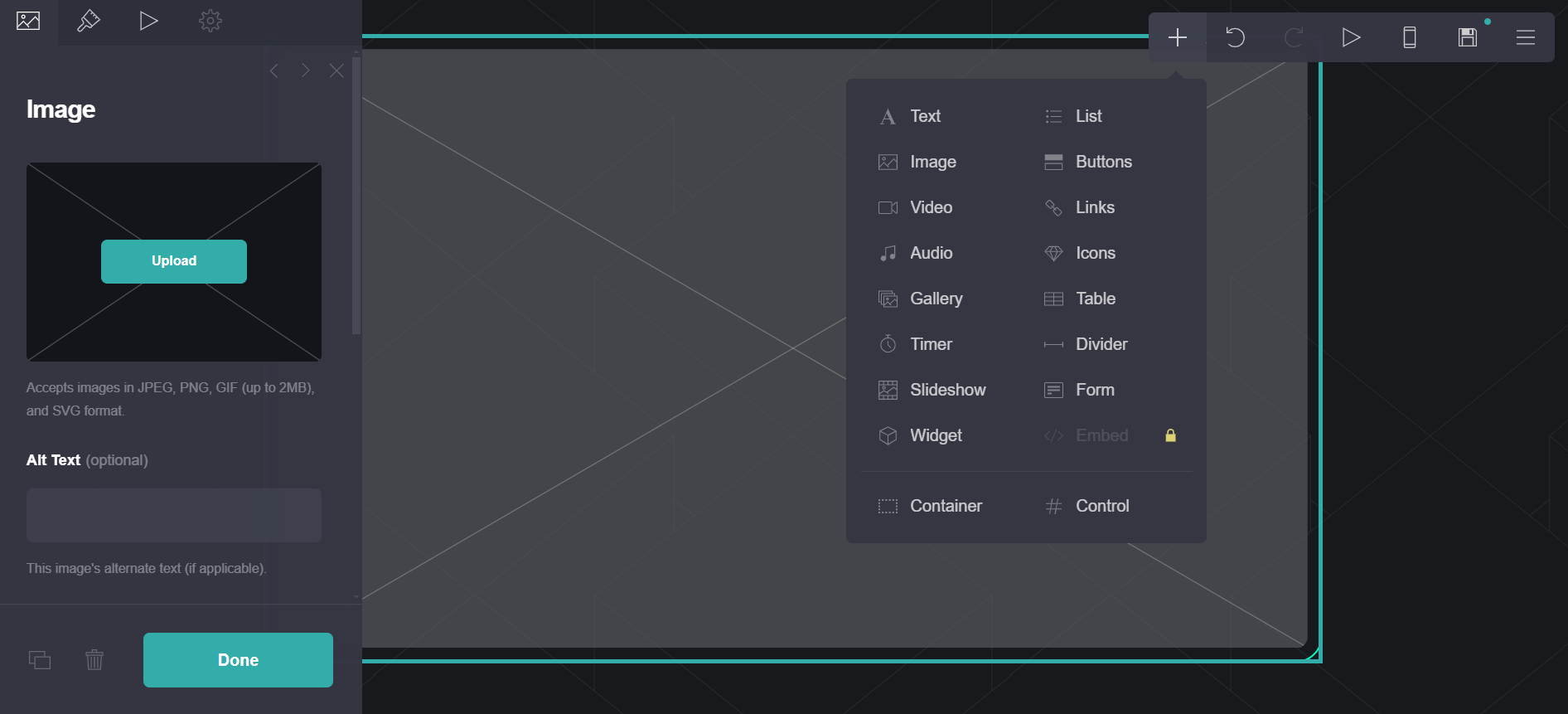
GoDaddy’s editor, scoring 6.7, is a user-friendly drag-and-drop tool enabling website creation without coding. It offers pre-designed templates, a mobile-friendly interface, basic SEO tools, and ecommerce integration, making it accessible for beginners, with affordable pricing plans and an all-in-one solution. However, it has some design limitations, basic features compared to dedicated platforms, a learning curve for extensive use, and potentially limited third-party app integrations.
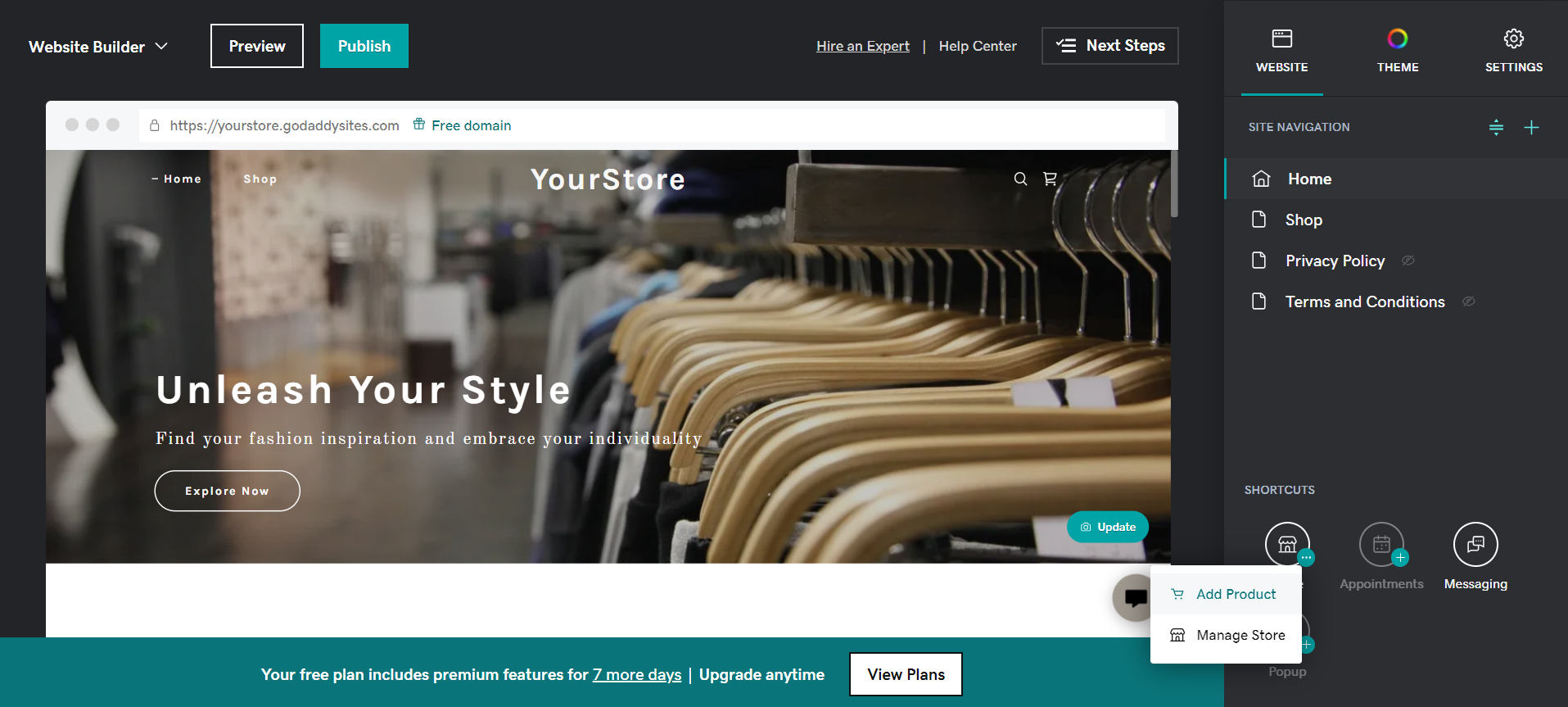
Mobile editor/app
 5.5
5.5
 5.5
5.5
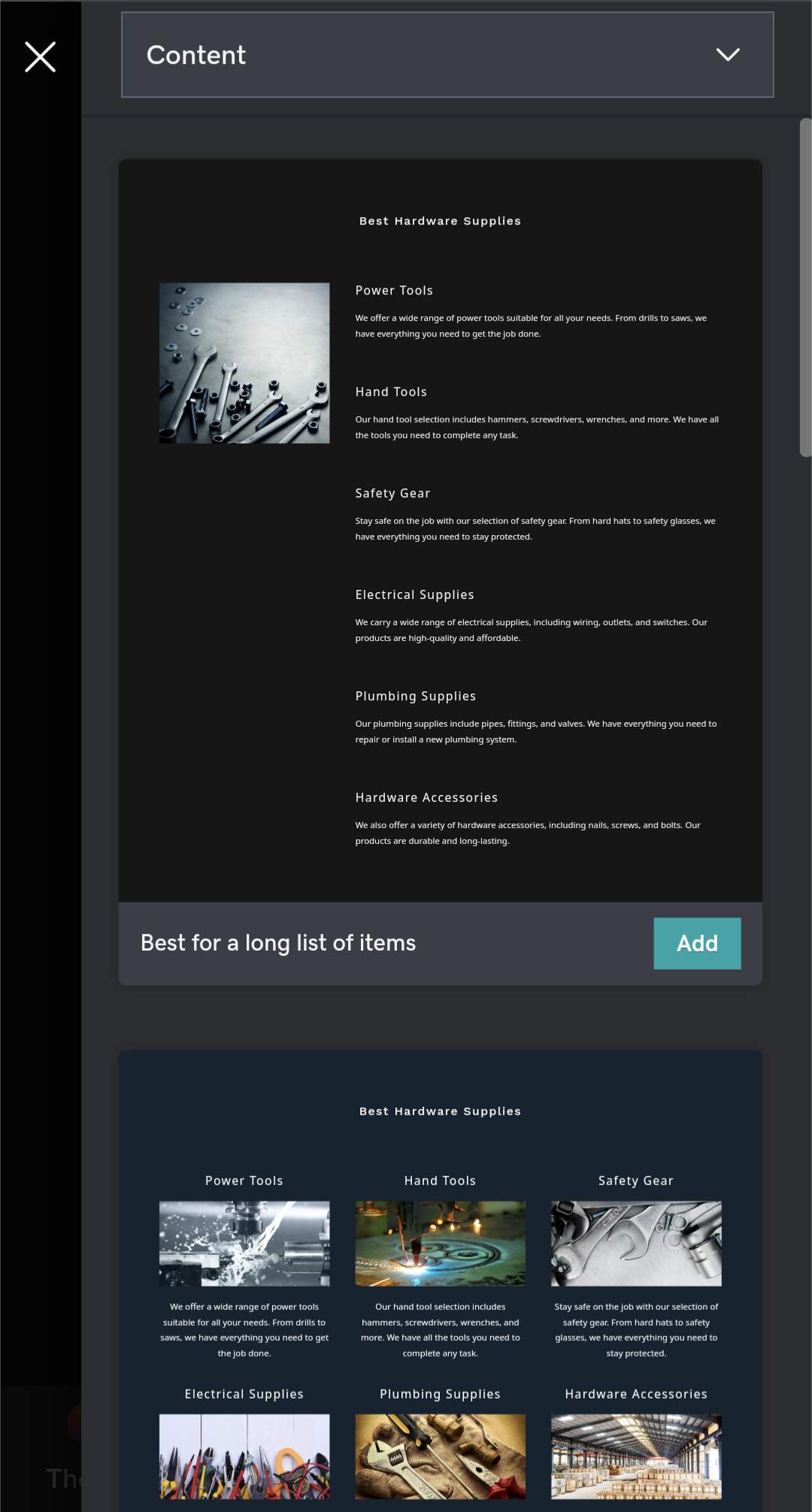
🏆
Winner: It’s a tie
. Both GoDaddy and Carrd do not offer a dedicated mobile app for editing websites. However, users can log into their accounts and access the website builder through a mobile web browser. While the experience might be slightly more constrained on a smaller screen, it still provides the flexibility to make changes on the go. Therefore, both GoDaddy and Carrd score equally in terms of their mobile editing capabilities.
Product testing options
Product Testing OptionsAssesses the options for trying out platform features before commitment.Score Components:
- Trial quality (40%): Extent and usefulness of the trial or free version.
- Feature accessibility (30%): How many features are available to test.
- Trial duration (20%): Length of the trial period.
- Ease of transition (10%): Smoothness of moving from trial to paid plans.
 8.1
8.1
 6.0
6.0
Overall Result
:
GoDaddy Wins
. GoDaddy scores 8.1 in product testing options, offering a free version, no trial version but a 30-day money-back guarantee, and the possibility to test all premium features within the refund window. Carrd, scoring 6.0, offers a 7-day free trial and the possibility to test premium features during this period, but does not offer a free version or a money-back guarantee.

|

|
|
|---|---|---|
|
Free Plan |
Yes |
No |
|
Trial Duration |
No (30-day money-back guarantee) | 7 days |
|
Testing Premium Features |
Yes, within 30-day refund window |
During 7-day free trial |
|
Money Back Guarantee |
30 days |
No |
Price
PriceLooks at the cost-effectiveness and value for money of each platform.Score Components:
- Plan value (40%): What each pricing tier offers.
- Transparency and clarity (30%): Clearness of pricing structures.
- Flexibility of plans (20%): Range of options to suit different budgets.
- Hidden costs (10%): Additional expenses not included in the plan.
 7.9
7.9
 8.9
8.9
Carrd offers more affordable plans, but GoDaddy provides a wider range of features and options, including enterprise plans for larger organizations.

|

|
|
|---|---|---|
|
Free |
Free ($0/month): Build a basic website with limited templates, storage, and features. Ideal for testing the platform. |
No offering at this amount. |
|
$0-$1 |
No offering at this amount. |
Pro Lite ($0.75/month): Basic features suitable for simple, personal websites. Up to 3 1-page websites. Value for price: 6.0 |
|
$1-$3 |
No offering at this amount. |
Pro Standard ($1.58/month): Offers more features and flexibility, ideal for professional profiles and small projects. Up to 10 1-page websites. Value for price: 7.5 |
|
$3-$8 |
Basic ($5.99/month): More templates, custom domain support, email marketing, SEO tools, social media integrations, analytics. Ideal for personal websites and small businesses Value for price: 6.5 |
Pro Plus ($4.08/month): Enhanced features for more complex sites, including additional customization options. Up to 25 1-page websites. Value for price: 8.5 |
|
$8-$10 |
Premium ($9.99/month): All Basic features + blog, ecommerce with product listings and payments, advanced marketing tools, and analytics. Ideal for businesses with online sales or growing web presence Value for price: 8.0 |
No offering at this amount. |
|
$10-$18 |
Commerce ($15.99/month): All Premium features + advanced ecommerce tools like cart recovery, discounts, reviews, memberships, and unlimited products. Ideal for businesses with significant online sales and complex product offerings Value for price: 9.0 |
No offering at this amount. |
|
$18+ |
Pro ($19.99/month): All Commerce features + priority support, higher bandwidth, website security, and CDN. Ideal for businesses with high traffic and critical online presence Value for price: 9.5 |
No offering at this amount. |
location. As a result in rare cases the prices displayed here can differ from the ones you see on their
websites.
Hosting quality
Hosting
qualityExamines the reliability and performance of the hosting solutions.Score Components:
- Uptime (40%): Consistency and reliability of website availability.
- Speed (30%): Loading times and performance.
- Bandwidth and storage (20%): Sufficiency of resources provided.
- Data centers (10%): Quality and distribution of hosting infrastructure.
 7.8
7.8
 5.0
5.0
🏆
Winner: GoDaddy
GoDaddy offers a variety of hosting types, including shared, VPS, dedicated, and WordPress hosting, and provides a 99.9% uptime guarantee. Carrd offers shared hosting but does not provide specific information on uptime or data centers. GoDaddy’s comprehensive hosting services and transparency give it a higher rating.

|

|
|
|---|---|---|
|
Do they offer hosting? |
Yes, included in all of their plans |
Yes, included in all of their plans |
|
Data Centers: |
Data Centers in USA, France, Germany and UK Cloud Services Through AWS |
Carrd doesn’t publicly disclose any information about its data centers. |
|
Type of hosting: |
Shared Hosting, VPS Hosting, Dedicated, WordPress Hosting |
Shared Hosting |
|
Uptime: |
99.9% |
Carrd.co does not provide any statistics on uptime and neither they have uptime guarantee. |
|
Uptime Guarantee: |
Yes, 99.9% |
No |
Website Speed Optimization
Website Speed OptimizationEvaluates optimization of website loading timesScore Components:
- PageSpeed Score (30%): Google’s score indicating performance optimization.
- Loading Time (30%): The average time until a website is fully interactive.
- Mobile Optimization (15%): Optimization effectiveness for mobile devices.
- Resource Optimization (15%): Optimizing images, scripts, and other heavy resources.
- CDN Usage (10%): Use of CDN to enhance speed across geolocations.
 7.6
7.6
 8.2
8.2
🏆 Winner: Carrd
Both GoDaddy and Carrd prioritize website performance and page speed, but Carrd’s simplicity and efficient design give it an edge in speed optimization.

|

|
|
|---|---|---|
|
Focus |
CDN, Automatic Maintenance, Resource Optimization |
Mobile Responsive design, Caching, Cloudflare CDN |
|
Performance Tools |
Infrastructure upgrades, caching mechanisms, image optimization tools |
Simplicity and efficient design |
|
Key Strategies |
CDN, Automatic Maintenance, Resource Optimization |
Mobile Responsive design, Caching, Cloudflare CDN |
|
Load Times |
Shared Hosting: 2-4 seconds, VPS Hosting: 1-2 seconds, Dedicated Server: 0.5-1.5 seconds |
Minimal due to simplicity of websites |
|
Page Speed Scores Range |
Shared Hosting: 50-70/100, VPS Hosting: 70-85/100, Dedicated Server: 80-95/100 |
Expected to be high due to simplicity of websites |
|
Core Web Vitals Improvement |
Infrastructure upgrades, caching mechanisms, image optimization tools |
Not disclosed |
GoDaddy has made significant strides in improving its platform’s speed and performance. It has implemented a range of strategies, including the use of a Content Delivery Network (CDN), automatic maintenance, and resource optimization. GoDaddy has also enhanced its infrastructure, including improved server infrastructure and data centers, resulting in faster loading times. Additionally, the implementation of effective caching mechanisms, image optimization tools, and automatic minification of code files contribute to a smoother user experience and improved Core Web Vital metrics. The website builder features optimized templates and code structures for efficient rendering, further enhancing overall performance.
On the other hand, Carrd’s simplicity and efficient design give it an edge in speed optimization. Websites built with Carrd are fairly simple, so load times are expected to be minimal, and page speed scores are expected to be high. Carrd’s key strategies for speed optimization include mobile responsive design, caching, and the use of Cloudflare CDN. However, Carrd does not disclose any information related to Core Web Vitals improvements.
Get a head start on website creation with AI
Create a custom website tailored to your business needs 10X faster with 10Web AI Website Builder!
Plugins and integrations
Plugins and integrationsMeasures the range and effectiveness of additional plugins and integrations.Score Components:
- Variety of options (40%): Range of available add-ons.
- Integration smoothness (30%): Ease of integrating plugins into the site.
- Quality of plugins (20%): Functionality and reliability of the options.
- Custom integration capabilities (10%): Support for custom or third-party integrations.
 7.3
7.3
 5.8
5.8
🏆 Winner: GoDaddy.
With a score of 7.3, GoDaddy offers a more extensive range of plugins and integrations compared to Carrd, which scores 5.8. GoDaddy’s plugins extend functionalities across various domains, including marketing, ecommerce, and business productivity. Carrd, on the other hand, offers plugins that enable functionalities beyond its base features, including advanced user interactions and sophisticated content presentation. However, GoDaddy’s access to the vast WordPress plugin repository gives it an edge over Carrd.
Marketing Features
Design FunctionalitiesRepresents how well each platform allows for creative design and customization of websites.Score Components:
- Template Variety (30%): Range and quality of design templates.
- Customization (30%): Flexibility and options for design alterations.
- User Interface (20%): Ease and intuitiveness of the design process.
- Responsiveness (10%): Adaptability to different devices and screen sizes.
- Innovation (10%): Unique design features and tools.
 7.3
7.3
 5.8
5.8
🏆
Overall Winner: GoDaddy
. GoDaddy offers a more comprehensive suite of marketing tools, including advanced SEO features, integrated email marketing, and robust analytics and reporting. Carrd, while offering similar features, relies more on third-party integrations.

|

|
|
|---|---|---|
|
SEO Tools |
|
|
|
Email Marketing |
|
Yes (through third-party integrations) |
|
Blogging |
|
|
|
Social Media Integration |
Tools for social media linking and content sharing |
Basic social media linking |
|
Analytics and Reporting |
Basic analytics with more detailed insights on higher plans |
Basic analytics through Google Analytics integration |
|
Ads and Promotions |
Features to create and track online ads, including Google Ads |
Yes (through third-party integrations) |
Customer Support
Customer supportEvaluates the quality and availability of support options.Score Components:
- Response time (40%): Speed of support responses.
- Support quality (30%): Effectiveness and helpfulness of the support.
- Availability (20%): Range of support channels (phone, chat, email).
- Resource richness (10%): Quality of self-help and educational materials.
 8.5
8.5
 6.2
6.2
🏆 Winner: GoDaddy
. In the comparison of GoDaddy vs Carrd, GoDaddy stands out with its comprehensive customer support options. GoDaddy offers 24/7 phone support in multiple languages, live chat, and email assistance, ensuring users can get help whenever they need it. Additionally, the 24/7 Community Forum and social media support provide further avenues for assistance, making it a robust choice for users seeking reliable support.
Carrd, on the other hand, provides 24/7 email support with responses typically within 24 hours. While this is sufficient for many users, it lacks the immediacy and variety of support channels that GoDaddy offers. Carrd’s straightforward support system is suitable for its user base, but it doesn’t match the extensive support infrastructure provided by GoDaddy, especially for enterprise-level needs.
Security
SecurityLooks at the platforms’ security measures and data protection.Score Components:
- Data protection (40%): Safeguards for user and customer data.
- SSL and encryption (30%): Implementation of secure connections.
- Compliance (20%): Adherence to industry security standards.
- Regular updates (10%): Frequency of security updates and patches.
 6.8
6.8
 7.6
7.6
🏆
Winner: Carrd
. Carrd has a higher security score of 7.6 compared to GoDaddy’s 6.8. Carrd ensures website security by automatically enabling SSL for all sites, including custom domains and subdomains. This SSL certification, issued via Let’s Encrypt, safeguards websites against unauthorized access and hacking. Carrd also implements measures to protect personal information online and offline.
GoDaddy, on the other hand, provides robust website security with plans offering features like SSL certificates, malware scanning, and web application firewalls. However, its options for private data storage protection are limited, especially for compliance with regulations like HIPAA or GDPR. Users should consider alternative solutions for comprehensive data security beyond the primary focus on web hosting.
AI Capabilities
AI capabilitiesMeasures the effectiveness of AI-driven features and tools.Score Components:
- Automation efficiency (40%): Impact of AI on streamlining processes.
- Personalization (30%): AI-driven customization for users or customers.
- AI-Assisted design (20%): Role of AI in website design and functionality.
- Data analysis (10%): Use of AI in interpreting user data and analytics.
 7.5
7.5
 0.0
0.0

|

|
|
|---|---|---|
|
AI Builder |
|
|
|
AI Ecommerce features |
AI-generated product descriptions, customer service tool, and digital ad creation |
|
|
AI Content Generation |
AI-generated product descriptions, customer service messages, and social media ads |
|
|
Additional AI features |
|
|
🏆 Winner: GoDaddy
. GoDaddy, with a score of 7.5, utilizes AI mainly to enhance the ecommerce experience and content generation. Its AI features focus on generating product descriptions, customer service messages, and social media ads. These tools aim to save business owners time and effort, allowing them to focus more on growth.
On the other hand, Carrd, with a score of 0.0, does not have any AI capabilities. It neither offers AI-powered ecommerce features nor content generation tools. Therefore, GoDaddy is the clear winner in terms of AI capabilities.
User Management
User ManagementAssesses the platforms’ capabilities in managing user roles, permissions, and accessibility.Score Components:
- Role Customization (40%): Flexibility in creating and defining user roles and
permissions. - Ease of Management (30%): User interface and tools for managing users.
- Access Control (20%): Effectiveness of access control measures for different user
levels. - Scalability (10%): Ability to manage a growing number of users efficiently.
 7.3
7.3
 4.3
4.3
🏆 Winner: GoDaddy
. GoDaddy and Carrd have different approaches to user management.
- GoDaddy’s number of users who can edit a website varies based on the hosting plan and website building tool. For Website Builder (GoCentral and Websites + Marketing), the free plan permits one user, while Deluxe and Ultimate plans allow up to five users with full editing permissions. In WordPress Hosting, there’s default support for unlimited users, each with customizable permission levels controlled through the WordPress dashboard.
- Carrd is primarily designed for individual use or small teams, with each account managing its own sites. The platform introduced a Team feature to allow multiple users to collaborate, but traditionally, Carrd sites are managed by a single account holder with full control. The specifics of access levels and permissions for collaborators, if available, are less detailed but generally include editing capabilities.
GoDaddy User Roles and Access Levels:
| Role | Description | Access Highlights |
|---|---|---|
| Account Holder | The primary owner of the GoDaddy Website Builder account. | Full access to all website builder features, domain management, hosting settings, and account settings. |
| Delegate Access | Users granted permission by the account holder to access specific parts of the GoDaddy account. | Can be given varying levels of access, from managing domains and products to making purchases on behalf of the account holder. |
| Website Editor | Users with permissions to edit and update the website through the Website Builder interface. | Can customize the website, add or edit sections (e.g., image galleries, menus), and update content. |
| Online Store Manager | Specifically for websites with e-commerce capabilities, managing product listings, orders, and payments. | Access to manage the online store, including product listings, coupons, shopping cart, shipping, and payments. |
Additional Features

|

|
|
|---|---|---|
|
SSL Certificate |
|
|
|
Custom Domain |
|
|
|
Free Custom Domain Included |
|
|
|
International Domains |
|
|
|
Mobile Responsive |
|
|
|
Page Speed |
|
|
|
Website Builder Mobile App |
|
|
|
Convert a Website To An App |
|
|
|
Website Analytics |
|
|
|
Multilingual Sites |
|
|
|
Multiple Users |
|
|
GoDaddy vs Carrd: User Feedback
Users generally praise GoDaddy for its affordability, reliability, and user-friendly interface, particularly in domain registration and hosting services. However, concerns include occasional interface changes, perceived slowness in website hosting, and dissatisfaction with pricing increases.
Users overwhelmingly praise Carrd for its user-friendly interface, excellent customer support, and attractive templates, making website creation effortless and enjoyable. The drag-and-drop builder, affordability, and mobile-friendly designs are highlighted as significant benefits. However, some users express limitations, such as the inability to create multi-page websites or a desire for more design options. Overall, Carrd is praised for its affordability, ease of use, and suitability for creating quick, simple webpages.
The making of this blog
We followed a clear, step-by-step process to write and research this article.
GoDaddy vs Carrd: FAQ
Which platform is better for creating single-page websites, GoDaddy or Carrd?
Can I use GoDaddy and Carrd for ecommerce?
How do GoDaddy and Carrd compare in terms of ease of use?
Which platform offers better customer support, GoDaddy or Carrd?
Are GoDaddy and Carrd suitable for users with no web development skills?
How do the hosting quality and website speed optimization compare between GoDaddy and Carrd?
Which platform is more affordable, GoDaddy or Carrd?









